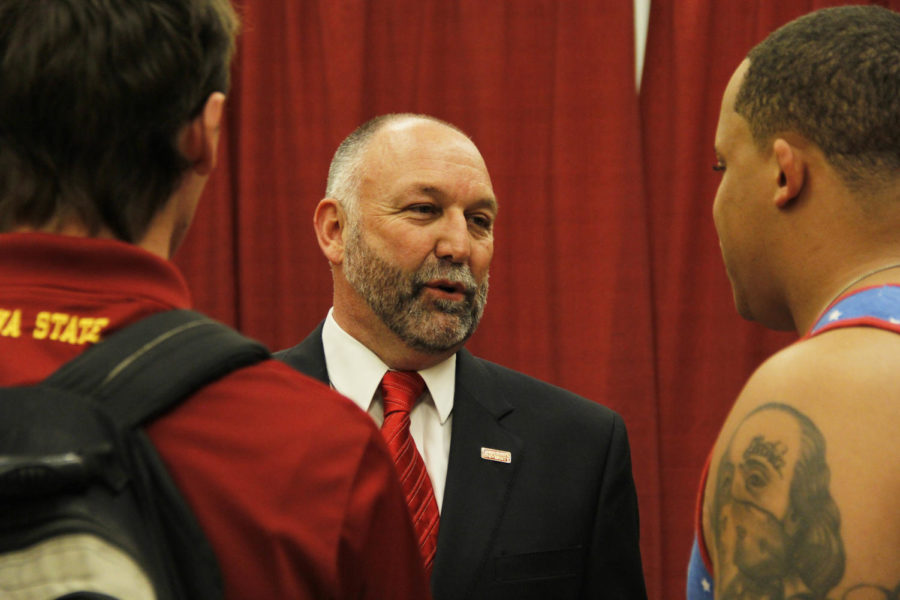Liu: Canceling Veishea will not bring peace to Ames community
Kelby Wingert/Iowa State Daily
President Steven Leath speaks with students after April 9’s press conference where he canceled the rest of Veishea celebrations as a result of April 8’s riot.
April 10, 2014
The morning after the riot near Welch Avenue and Stanton Avenue, the whole campus buzzed with shock and awe at the incident. However, when President Steven Leath announced April 9 that Veishea was canceled, the students were slack-jawed with disbelief and disappointment.
Of all the traditions held at Iowa State, Veishea is the biggest and most notable event of the school year and one that many ISU students look forward to participating in. The cancellation did not come as a surprise in response to the violent gathering, but to many students who had planned their week around the celebration, suspending all Veishea events is not only excessive, it will also not solve the root of the problem for rioting or other dangerous behaviors that happens off-campus.
Despite the unfavorable impression that many have about Veishea from this recent debacle, there are more times that the student body has restored and maintained the name of the tradition than not. Since the very first Veishea at Iowa State in 1922, rampages by students that required the intervention of local authorities have been rare, only occurring sporadically.
Since the first rampage in 1988, the university’s president and higher authorities have been taking measures to ensure the safety of the community during the event. The fingers almost always have seemed to point to alcohol as the cause of rowdiness in students. Therefore in 1997, ISU President Martin Jischke banned all alcohol during Veishea. Although the pledge was later dropped by the next president, Gregory Geoffroy, because of protests by the students’ government, Veishea events have been kept alcohol-free ever since.
However much the administration tries to contain parties or alcohol consumption, the school could not stop the students from taking it to the streets. Tanner Howard, an ISU alumnus who had been on the Veishea committee for all four years of college and on the executive board for three of those years, said that the school never had any control over what students do off-campus.
“The people that were part of the riot just wanted to party, and Veishea gave them an excuse to do that,” Howard said. “Most of them probably are not even interested in the actual Veishea activities. They have nothing to do with Veishea.”
When asked whether he thought Veishea being canceled was a good decision in the face of this recent uproar, Howard disagreed. “The Veishea committee and sub-committees spend months ahead of time planning for this event. It’s lengthy and exhausting. Unlike other organizations on campus, we meet and work for at least several hours every week up to the month before Veishea, when we would meet almost every day.”
Canceling Veishea, Howard says, would only hurt the people who planned it and who legitimately wanted to enjoy themselves at the parade, the cherry pie run and the performances.
The decision, although understandable given the circumstances, does not seem to be the answer to the problem.
“I know this is supposed to be a punishment for what happened that night, but I do not think the people that were there learned their lesson. If anything, they might be even more rowdy because now that they have taken Veishea away, they have nothing to lose,” Howard said. “The school has never been able to control how much people party, and stopping Veishea will have no effect on them whatsoever.”
Chad Cook, senior in linguistics, also thought the cancellation was uncalled for. “I was never much of a Veishea person, but even I was disappointed to hear that all those fun activities were canceled. It is just a bit much to cancel everything.”
Bianca Peixinho, who had heard about the suspension from her professor, said she was shocked. “I am really sad that it is canceled, but I also understand why it had to be done, so I am a little torn. Since the riot, I am kind of afraid to go to any parties.”
The violent disturbances not only upsetted the Ames community, but brought a bad light upon the reputation of the school. Even Howard admits that safety should come first. “I think President Leath did the right thing, especially considering the damages done and injuries sustained from the riot. Because of the actions of a few idiots, everyone have to suffer. If only it means keeping people safe, then, I’d hate to admit it, but Veishea would have to go.”
Leath, the Veishea committee and other relevant parties need to have a good long discussion about preventive measures and perhaps bump up the penalty for disruption of peace within the community for future celebrations, that is if we were to have one at all.
The administration can sweep Veishea under the rug and make the students feel like grounded teenagers, but such measures should not be the end. Rather they should be a beginning; hopefully this incident can incite meaningful discourse among the campus community on the dangers of a mob mentality that causes people to partake in decisions based on popularity. Veishea is a joyous occasion that celebrates the pride we take to be a part of Iowa State, so let us show the school that we care enough for the event and the community to curb our misguided enthusiasm.







